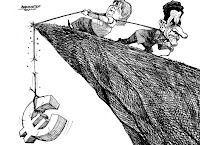By Tyler Durden of ZeroHedge
The EU summit to save the Euro (the nineteenth, or thereabouts) has, quite remarkably, agreed to do something to try and save the Euro. The whole build-up and conclusion to this summit have brought a sense of nostalgia to some observers; the disillusionment in advance, the insistence by national leaders that absolutely nothing would be sacrificed, the dervish-like spinning of “informed sources” and unnamed officials, the late-night brinkmanship, and then the highly personal process of striking a deal amongst heads of government.
Paul Donavan, UBS: [excepted from] One money, one banking system, one fiscal policy?
Going into this summit we had a monetary union in Europe that clearly did not work. Coming out of this summit we have a monetary union that still does not work.
As ever with a Euro summit there are unanswered questions.Grandiose statements are what heads of government specialise in – the details are left to later (it is one of the reasons why Maastricht produced a monetary union that was flawed from the outset.Once “create a single currency” had been agreed, politicians lost interest). The statement from the summit itself was woefully inadequate, and most of the details have been fleshed out with press conference statements. Doubtless more details will be forthcoming as heads of government return to their own countries and brief their local media on how they “won” in Brussels. So what additional questions need to be answered?
- Will the bank supervisor have real powers? In particular will the bank regulator be able to close down banks, even if those banks are national champions? They should have this power, otherwise the threats that they can make are going to be largely impotent. Ultimately, we would need to see the regulator able to force changes to banks even if they have not asked for capital injections (as happens in every other functioning monetary union). Are Euro area nations prepared to surrender their sovereignty to the extent that “foreigners close our banks / foreclose our mortgages”?
- Chancellor Merkel of Germany has declared that there must be conditions for direct bank recapitalisation. This does not, perhaps, occasion much surprise in financial markets as Chancellor Merkel of Germany is very keen on conditions. But how are these to be imposed? There needs to be a set of “standing conditions”, rather than case-by-case conditions, if the mechanism is to work properly – per the need for an apolitical capital injection process, outlined above.
- What about those countries that have already bailed out banks with Euro area assistance?Assuming that direct recapitalisation does not take place before the end of this year, that list is Greece, Ireland, Portugal, Spain and Cyprus (countries that have or will have used EFSF money to bail out their banking systems). Other countries have bailed out their banks with national funds. Where does the process stop? This is absolutely critical to resolve, and of course has a huge potential impact on sovereign bond markets (because it impacts individual sovereign debt to GDP considerations).
- Who guarantees deposits? This has not been clarified. If deposits are guaranteed nationally, but the banking regulator is supranational, why should a domestic sovereign have to bear the cost (deposit insurance) of a decision (close a bank) that is taken at a supranational level. However there is obviously a cost burden to guaranteeing banks’ deposits at a pan Euro level – and the question “why is our tax money being used to guarantee lax foreign banks’ depositors?” is bound to arise.
For liquidity injections the announcements are full of good intentions, but they do not in fact change anything regarding the solvency of banks today. What is changing is who foots the bill for the solvency of banks (eventually) and thus the link between the banks and the sovereign. Although there has been some positive reaction in bank CDS so far, it is not clear whether this will suddenly make money markets more functional.
A healthy dose of economists’ cynicism is probably best taken at this point. Money market normalisation is likely to take more than a high-flying statement from the Euro area to resolve. As such, the economic effectiveness of liquidity injections is likely to remain low (to nil).
Courtesy Tyler Durden, founder ofZeroHedge
The views and opinions expressed herein are the author’s own, and do not necessarily reflect those of EconMatters.
(C) EconMatters All Rights Reserved




